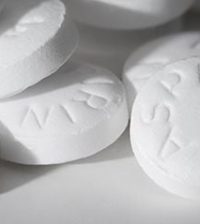- Fragments of Bird Flu Virus Found in U.S. Milk Supply
- There’s an ‘Epidemic’ of Loneliness Among U.S. Parents, Poll Finds
- Infertility Is Rising Among Young Married Women
- New Rules Mean 3.6 Million Americans Could Get Wegovy Via Medicare, Costing Billions
- ‘Dream It, Be It?’ Study Finds Teens Who Focus on Life Goals Often Succeed
- Trying ‘Magic Mushroom’ Drug to Ease Depression? It Has Side Effects
- $282 Billion: What Mental Illness Costs America Each Year
- Black, Hispanic Americans Getting Savvier About CPR
- Kids With Common Skin Conditions Face Stigma, Bullying
- Science Reveals How Aspirin Prevents Colon Cancer
Meth Abuse Could Up Stroke Risk in Younger Users

Younger adults who use methamphetamine may be at greater risk for stroke, a new review suggests.
With use of the stimulant increasing, particularly in more potent forms, doctors in many countries are seeing more meth-related disease and harms, the Australian study authors said. This is especially true among younger people, who are the major users of the drug.
“It is likely that methamphetamine abuse is making a disproportionate contribution to the increased incidence of stroke among young people observed over recent years,” said researchers led by Julia Lappin. She’s with the National Drug and Alcohol Research Center at the University of New South Wales in Sydney.
These strokes can lead to disabilities or death, she and her colleagues pointed out.
For the review, Lappin’s team analyzed 77 studies that investigated the link between methamphetamine use and stroke risk in adults younger than 45. They identified reports of 98 strokes — 81 caused by bleeding into the brain (hemorrhagic) and 17 caused by a blood clot (ischemic). Men were twice as likely as women to suffer one of these strokes.
Ischemic strokes are more common in the general population.
But eight out of 10 of the strokes associated with methamphetamine abuse were bleeding strokes, the researchers said. This is a dramatically higher rate than typically reported among people in this age group and older adults.
The brain bleeds also increased the risk of death among younger methamphetamine users: One-third of them died, the study found.
Bleeding strokes were associated with the drug regardless of whether it was swallowed or injected. In about one-third of all cases, the strokes were linked to inflamed blood vessels and high blood pressure, the researchers said.
They added that methamphetamine abuse could cause high blood pressure in otherwise healthy people.
The study was published online Aug. 23 in the Journal of Neurology Neurosurgery & Psychiatry.
More information
The U.S. National Institute on Drug Abuse provides more on methamphetamine.
Source: HealthDay
Copyright © 2024 HealthDay. All rights reserved.










